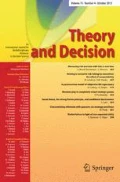Abstract
We treat a class of multi-person bargaining mechanisms based on games in coalitional form. For this class of games we identify properties of non-cooperative solution concepts, which are necessary and sufficient for the equilibrium outcomes to coincide with the core of the underlying coalitional form game. We view this result as a non-cooperative axiomatization of the core. In contrast to most of the literature on multi-person bargaining we avoid a precise specification of the rules of the game. Alternatively, we impose properties of such games, which give rise to a large class of mechanisms, all of which are relevant for our axiomatization.
Similar content being viewed by others
REFERENCES
Albers, W. (1975), Zwei Lösungskonzepte für kooperative Mehrpersonenspiele. die auf Anspruchsniveaus der Spieler basieren, OR-Verfahren, XXI, Meisenheim, 1–13.
Bennett, E. (1983), The aspiration approach to predicting coalition formation and payoff distribution in sidepayment games, International Journal of Game Theory 12, 1–28.
Chatterjee, K., Dutta, B., Ray, D. and Sengupta K. (1993), A noncooperative theory of coalitional bargaining, Review of Economic Studies 60, 463–477.
Harsanyi, J.C. and Selten, R. (1988), A General Theory of Equilibrium Selection in Games, Cambridge, MA: The MIT Press.
Fudenberg, D. and Tirole, J. (1991), Game Theory, Cambridge, MA: The MIT Press
Moldovanu, B. and Winter, E. (1994), Core implementation and increasing returns to scale for cooperation, Journal of Mathematical Economics 23, 533–548.
Moldovanu, B. and Winter, E. (1995), Order independent equilibria, Games and Economic Behavior 9, 21–34.
Okada, A. (1992), Noncooperative bargaining and the core of an n-person characteristic function game, Control and Cybernetics 21, 231–250.
Peleg, B. (1986), On the reduced game property and its converse, International Journal of Game Theory 15, 187–200.
Perry, M. and Reny, P.J. (1994), A noncooperative view of coalition formation and the core, Econometrica 62, 795–817.
Rubinstein, A. (1982), Perfect equilibrium in a bargaining model, Econometrica 50, 97–109.
Selten, R. (1981), A noncooperative model of characteristic-function bargaining, in: V. Boehm and H. Nachthanp (eds.), Essays in Game Theory and Mathematical Economics in Honor of Oscar Morgenstern, Bibliographisches Institut Mannheim, 139–151.
Selten, R. (1992), A demand commitment model of coalitional bargaining, in: R. Selten (ed.), Rational Interaction – Essays in Honor of John C. Harsanyi, Berlin, Springer, Verlag, 245–282.
Winter, E. (1996), Mechanism robustness in multilateral bargaining, Theory and Decision 40, 131–147.
Winter, E. (1997), Negotiation in multi-issue committees, Journal of Public Economics 65, 323–342.
Author information
Authors and Affiliations
Rights and permissions
About this article
Cite this article
Okada, A., Winter, E. A Non-cooperative Axiomatization of the Core. Theory and Decision 53, 1–28 (2002). https://doi.org/10.1023/A:1020811218051
Issue Date:
DOI: https://doi.org/10.1023/A:1020811218051


